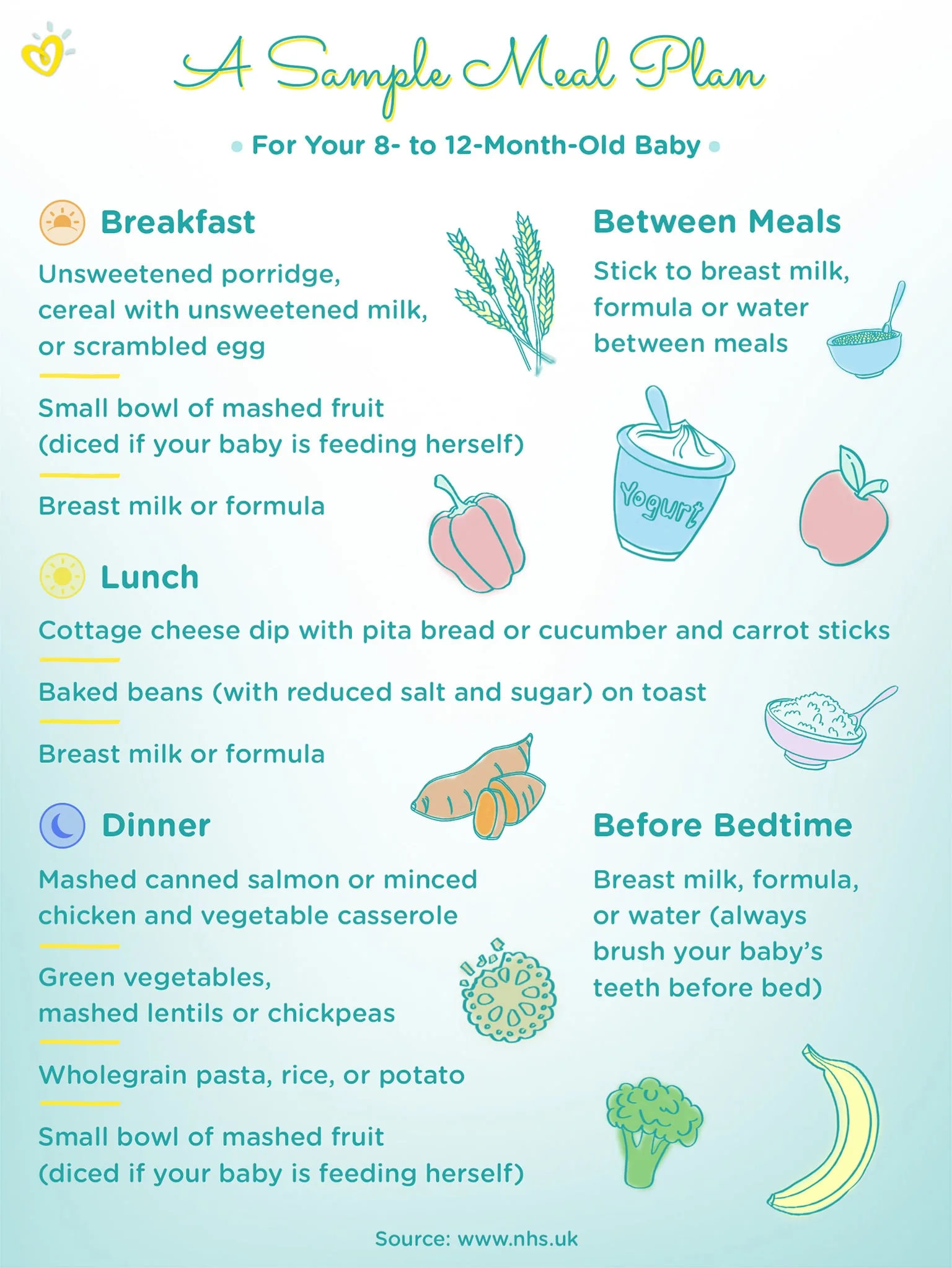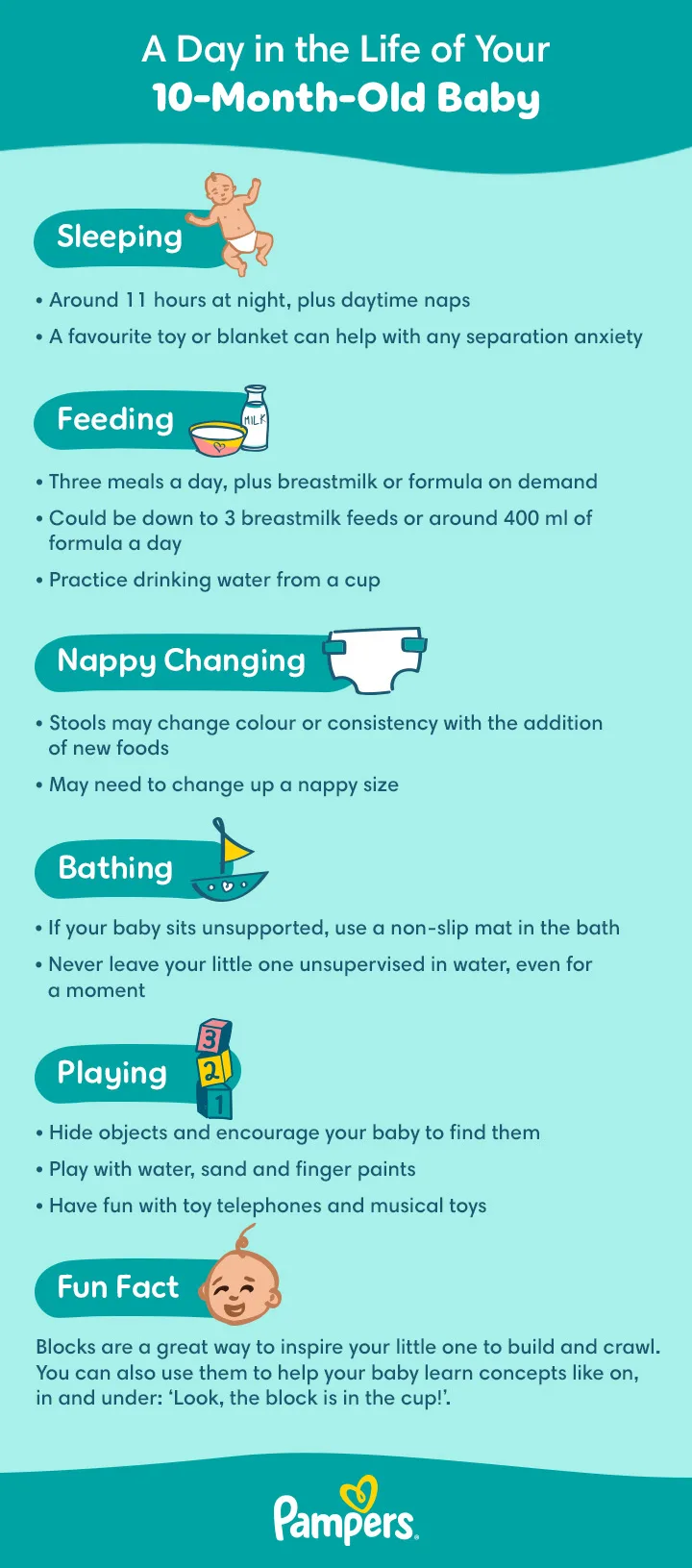10-Month-Old-Baby: Upward and Onward
Wondering what your baby might learn in the coming weeks, and what you can do to help his development? Here’s a sneak peek into what your 10-month-old baby might like to try eating, how long he might need to sleep, which development milestones he might achieve, and guidance on how you can play together this month. Let’s dive right in!
Baby Development Milestones
One of the paradoxes of your baby’s development at 10 months is that while he’s eager to become more mobile and independent, he may also be cautious about straying too far from you and may even cry when you’re out of sight. Read on to learn more about what your 10-month-old baby may be experiencing this month, including the development milestones that might be coming up around this time.
Physical Development: Caught Flat-Footed
If your baby is standing or has taken a few steps, you may have noticed that he or she seems to have flat feet. Not to worry: all babies start out flat-footed. This is because babies are born with a fatty pad in the foot, which hides the developing arch. Plus, at this stage your baby’s foot and leg muscles are not strong enough to support the arch, but it will begin to develop once your little one is about two years old.
Movement: Up, Up and Away!
By now, your baby can perform an impressive range of movements whether it’s arching his or her back during tummy time to look around, or sitting up, rolling over, rocking on hands and knees, crawling or even pulling him or herself upright. All of these movements strengthen the muscles, improve coordination, and teach your little one what his or her various body parts can do.
Once your baby can stand more confidently, he or she might take a few tentative steps while holding onto furniture. This is known as ‘cruising’. Soon, your little one might try taking a few cautious steps without holding onto anything.
Cognitive Development: Hello, Can You Hear Me?
Long before your baby can say real words, he or she can understand some of what you’re saying. For example, when your baby might wave when you say ‘bye-bye’. Whether it’s now or in the coming months, your little one will soon be able to say simple words like ‘no’, ‘mama’ and ‘dada’.
Your baby might try to mimic the way you use objects, too. He or she might put a toy phone to his or ear, just like you do. Take advantage of this interest in imitating you by teaching your little one how objects are used. Let your baby ‘brush’ his or hair with a hairbrush or teeth with a toothbrush. At mealtimes, give him or her a cup and spoon to play with.
How to Support Your Baby's Development
As always, there are many things you can do to help your baby grow and develop. Here are some great ideas you might like to try this month:
Place some toys on the sofa just out of your baby’s reach to encourage him or her to pull to stand. Push and pull toys are also a great way to help your little pull him or herself upright.
Sit on the floor with your baby and roll a ball back and forth between you. Balls are a lot of fun, and can be used to teach a number of things, such as rolling, pushing, throwing or dropping.
Let your baby look at his or her reflection in a childproof mirror. Smile, laugh and pull faces together.
Introduce your baby to the names of body parts. For example, describe your baby’s body parts when bathing or dressing, or when your little one points at you, name the body parts he or she is pointing to.
Feeding Your 10-Month-Old Baby
From 10 months on, your little one might enjoy food with bigger soft lumps and an even wider range of finger foods. You might also try giving your baby a fruit or milk-based pudding after the savoury dish. If your little one’s really starting to enjoy solids, you might decide to celebrate this exciting milestone by going out for a meal together, if you haven’t already.
Food safety is very important when it comes to feeding your little one, because babies are particularly at risk of food poisoning. Follow these simple guidelines to help ensure food is prepared safely:
Always wash your hands before preparing or touching your baby’s food. Make sure your baby’s hands are clean too.
Thoroughly clean chopping boards, utensils, feeding bowls and spoons after use.
Use a different chopping board for raw food and ready-to-eat food.
Keep raw meat in a sealed container in the fridge and make sure it doesn’t come into contact with other food.
Cook everything thoroughly before giving it to your baby, especially eggs and shellfish.
A Day in the Life of Your Baby
Each day with a 10-month-old baby is a little different, but here’s just one example of what a day in your baby’s life might look like this month:
How Much Sleep Does a 10-Month-Old Baby Need?
Ten-month-old babies typically sleep for up to 12 hours each night and need about 2.5 hours of sleep during the day. If getting your baby to fall asleep continues to be a struggle, or if your little one still wakes up several times during the night, you might want to try moving him or her into a separate room for sleeping, if you haven’t already.
Although it is recommended that you keep your baby in the same room at night for the first six months to reduce the risk of cot death, older babies sleep better and longer when sleeping apart from their parents.
Your Baby’s Health: Dental Care
You might have seen your baby’s first tiny teeth poke through − or perhaps not as the timing for this varies widely. Usually, by the time your little one is two and a half all of the primary teeth will be in. No matter how many teeth he or she has now, or when they start to poke through, it’s important to care for your baby’s teeth and gums each day. Here’s how:
Sit your baby on your knee, with his or her head against your chest.
Clean your baby’s teeth twice a day with a soft baby toothbrush and a tiny smear of fluoride toothpaste designed for babies. Do this once just before bed and a second time during the day. Read more about baby dental care, including what toothbrush to pick and how long to brush for.
Brush the teeth in small circles, covering the entire surface, and encourage your baby to spit out instead of rinsing with water, as this would wash away the fluoride.
If your baby doesn’t like having his or her teeth brushed, try turning it into a game instead of a battle, for example by singing or playing a song your little one likes.
FAQs at a Glance
There are a number of things you can do to encourage good sleeping habits:
- Avoid stimulating your baby before bedtime.
-
Try to establish and follow a bedtime routine to help set your baby’s sleep/wake patterns. The routine should last about half an hour and should be followed consistently, every night. It can include the following:
- giving your baby a bath
- brushing his or her teeth (if there are any to brush)
- changing your little one into night clothes and a fresh nappy
- reading him or her a bedtime story or singing a lullaby
- giving a goodnight kiss and cuddle
- turning on the wind-up musical mobile when you leave the room
- Place your baby into the cot sleepy, but not asleep.
- If your baby is not asleep within 15 minutes and cries, leave him or her to see if he or she’ll settle by herself.
- If your little one keeps crying, soothe your baby without too much interaction.
Your Life as a Parent: Tips for Sharing Parental Duties
Talking about parenting with your partner can be challenging. The key is to remember that there is no ‘perfect’ family, nor one way to parent, and that roles and responsibilities may need to change along the way. Figuring out how to share parenting duties and household chores is going to be an ongoing discussion. Consider these ideas:
Split the chores. Create a list of the common daily, weekly, and monthly household chores and find a way to split these chores fairly. Perhaps one parent can contribute more mid-week, while the other takes over on weekends.
Take turns with baby care. One or both of you may be working, but you’re both likely to want to be involved and invested in raising your child. Can you share who gets up at night to soothe your little one if she cries? Can one of you handle the morning feeds, the other the evenings? Can you split who takes days off if your baby is sick, and share who does the childcare runs?
Spend time together as a couple. Set aside some time regularly when you can be together as a couple in a more relaxed way, even if it’s just a short walk or enjoying a takeaway dinner.
Seek help to resolve conflicts. Conflicts are a natural part of a relationship and every family dynamic, but your little one is sensitive to the emotions of the people who care for him or her. If you need help resolving conflicts, ask your health visitor or GP, or try the confidential live chat service offered by Relate or the free live chat service Listening Room of Click Relationships.
Checklist for This Month
If you haven’t already, schedule your baby’s first visit to the dentist. Before you go, read our guide to taking your baby to the dentist.
Stock your medicine cabinet with basics like paracetamol and ibuprofen for fever, saline nose drops for a stuffy nose and oral rehydration sachets. Always consult your baby’s health visitor, child centre or GP before giving your baby any medication. Remember to keep medicines safely out of reach of your baby, and keep in mind that some need to be refrigerated. Medications have use-by dates, so don’t forget to dispose of expired or unused medicines.
Prepare a first aid kit for your home and car. You might include things like
plasters in different sizes
sterile gauze dressings in different sizes
alcohol-free cleansing wipes
sticky tape
rolled bandages
safety pins
antiseptic cream
painkillers (e.g. infant paracetamol or ibuprofen)
digital thermometer
scissors
tweezers
cream or spray for insect bites and stings
children’s antihistamine.
If you have a little downtime this month, check out what kinds of things may happen once your baby is 11 months old.
For even more information on your baby’s development in the coming months, sign up to get our regular emails:
10 month old baby - checklist






